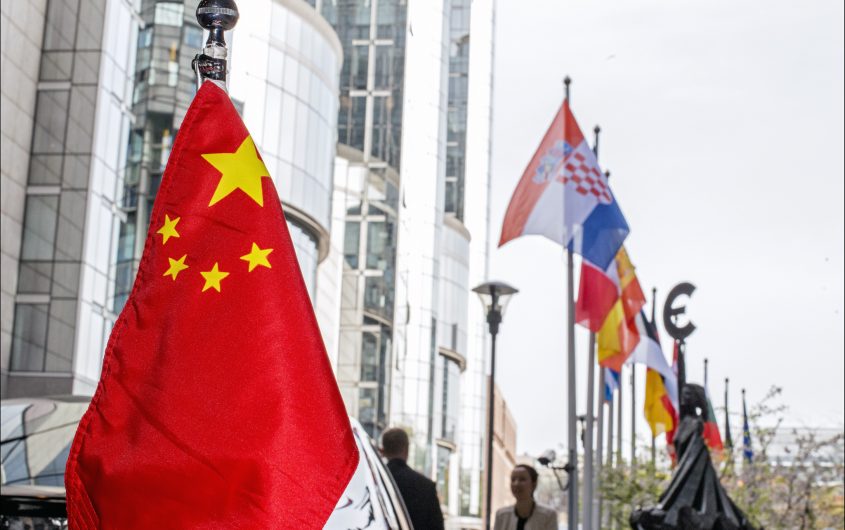
European Parliament via Flickr
In Times of China’s Claim to Power: Transatlantic Partnership at a Crossroads

Simon Schütz
German Association of the Automotive Industry (VDA)
Simon Schütz works as the head of communication for the German Association of the Automotive Industry (VDA) in Berlin. Before that, he was a Responsible Editor at BILD, covering U.S. politics as well as domestic politics in Germany. In addition, he freelanced for the American National Public Radio (NPR), where he wrote mostly about current developments in Germany.
Simon graduated from Freie Universität in Berlin, with an MA in strategic political communication. He also studied at George Washington University in Washington, DC, where he primarily focused on public diplomacy and campaigning during elections and in Bordeaux, France.
Reactions and strategies to fight the coronavirus crisis have varied around the globe. While the world is still trying to manage life with the virus, the pandemic could also mark the beginning of a new Chinese era. There are many signs that China is aiming to increase its influence on the world stage.
Where it has been mostly economic in the past, the Chinese strategy today seems to focus more and more on a geopolitical outlook. From its the aggressive attempts to disempower protestors in Hong Kong to its efforts to exploit the U.S. Navy’s coronavirus challenges in order to improve its standing in the South China Sea, China’s determination to increase its power on the world stage is becoming more visible.
The U.S. and its Western partners are increasingly aware of China’s global influence campaign that started by first establishing something like regional hegemony and converting economic engagement into political influence. But what has become more visible during the coronavirus pandemic is the attempt to create and build an order that benefits China across Asia and even Europe. China’s Belt-and-Road Initiative builds and finances infrastructure in developing countries, putting China in a prime position concerning global trade and economic relations.
Once again, the coronavirus seems to play into Chinese hands. Since China restarted its economy earlier than others, there are indications of China trying to use its competitors’ economic downturn by claiming additional market share for itself. This approach aims at building geopolitical influence through economic power.
While China is trying to increase global influence, the management of the coronavirus by U.S. president Donald Trump is not received as an example of competent leadership in tackling a global crisis. Quite the contrary: As the U.S. appeared to be affected more and more by the virus China attempted to fill the leadership void through “mask diplomacy.” China sent teams of doctors and personal protective equipment (PPE) to countries all over the world, causing some to look at China as being the helpful power. China’s hidden agenda was invisible to those in desperate need of help.
Especially in Europe, China precisely chose who to help and how to promote it in its own favor. Those soft power moves usually would be expected from the U.S., but such U.S. efforts were rare—and started much later—in this crisis. Encouraged by the Trump administration’s general decrease in foreign aid and its withdrawal from global networks and international institutions, the Chinese are very aware of that open gap. By taking stronger positions in global institutions, China tries to shape the world’s economic rules as well as tech standards to advance its own position and image.
Since Trump took office, Beijing has tried to portray itself as a reliable partner of Europe in defending the existing rule-based global order. Problematically, many European leaders have been naïve in the past, making it easier for China by making European economies increasingly dependent on the Chinese market. China knows how to exploit those dependencies, as can be seen in the question of 5G.
A rebalancing in this context is needed, and the post-coronavirus world might give Europe a chance—if it acts united and with one voice. For now, Europe sees China as a “strategic partner” and a “systematic rival”—two identities at odds with each other.
One thing is sure: This is a crucial moment in the transatlantic relationship. The coronavirus pandemic so far has rather weakened the partnership. If Europe and the U.S. act wisely and take crucial steps right now, the aftermath of the virus can be used to recalibrate transatlantic cooperation. Germany will take over the EU Council presidency in July; Merkel has emphasized that the relationship with China will be one major focus of foreign policy during that presidency. However, due to COVID-19, the long-planned EU-China Summit on September 14 has been cancelled.
Merkel also made clear in a speech end of May, that Europe’s most important partner is the United States. “Of course, I am aware that working with America is currently more difficult than we would like it to be,” Merkel added. A sober analysis of the status quo should generate adequate ideas to improve and strengthen that very important relationship.
As terrible the effects of COVID-19 are, the aftermath of this crisis creates a time slot of opportunity for new impulses on projects that haven’t been realized yet or even on new ideas to strengthen the transatlantic bond.
One example for this is the transatlantic trade deal, which seems far from being realized in the past. Both sides should put these negotiations as a top priority on their agendas right now. Such a deal could not only stimulate struggling economies and end ever-resurging trade disputes, but also could help to reinforce investor confidence. Both aspects will be highly needed in the aftermath of this crisis.
When it comes to reducing the dependence on China, especially on medical supply chains, the U.S. and Europe are in the same boat. Therefore, it is essential to synchronize the approach to this problem. Only if the EU and U.S. work together can they reduce dependency on China—and bring the EU and the U.S. closer to each other again.
The withdrawal of the U.S. from the WHO should be an alarm signal for European countries. Instead of pushing the tensions, the U.S. and Europe should take joint action in reforming the WHO by making it more transparent and accountable. U.S. concerns about Chinese influence on the organization should be taken seriously. If the U.S. and the EU manage to work together on this, they can prevent a vacuum that China is waiting to fill.
The transatlantic relationship faces a crossroads. The biggest problem is that the U.S. and the EU are currently not pursuing some of their shared goals with the same strategy toward China. Even worse, in panicked responses to fast developments, they are stressing their differences rather than what still unites them as liberal democracies in a dangerous world. Now is the time for aligned strategies and coordinated efforts to solve shared problems—the process and the outcome can bring both sides closer together again.
At the same time, the current developments demand a European future strategy:
In the ongoing competition between the U.S. and China, Germany and the European Union should not feel obliged to choose one side – the EU should leverage its own interests and stand up for its values. Germany should use its EU Council presidency to push forward a world order in which Brussels plays an equal role as Washington and Beijing. This cannot be done with effective leverage. When it comes to certain conflict areas, Europe should dare to take an equidistant position between Beijing and Washington. By showing European unity and a determination to assert European interests, even by sometimes choosing the help of one of the other two members of the trilateral power system (alternating alliances), Europe could win the respect and power leverage it needs to not be worn down between China and the U.S.








